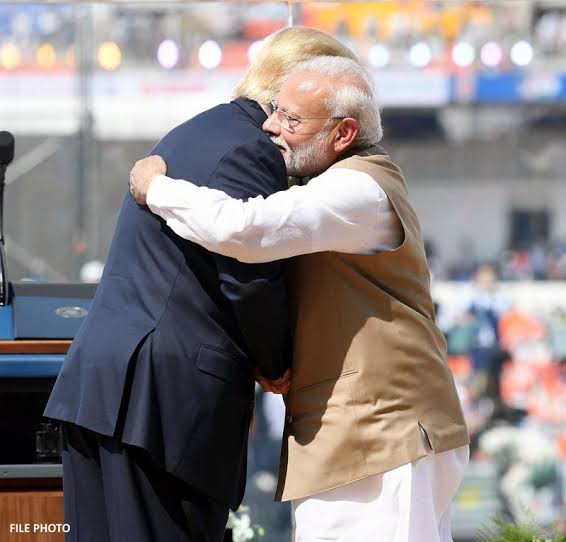Prime Minister Narendra Modi’s recent jaunt to the United States, his first in the so-called Trump 2.0 era, was met with the kind of enthusiasm back in India that you’d expect at a rock concert. The visit, splashed across Indian media as a diplomatic triumph, seemed to soothe the nerves of many who feared the unpredictable winds of Trump’s foreign policy. The joint statement from the Modi-Trump summit was like a diplomatic love letter, emphasizing a robust future for Indo-US relations amidst global uncertainties fueled by Trump’s trade tantrums and his penchant for reshaping the world order.
India’s Special Sauce in Global Politics
Let’s face it, Trump had to show India some love. Unlike the behemoths China and the EU, India isn’t just another number in the global ledger; it’s the world’s largest democracy and one of the fastest-growing economies. This gives India a kind of VIP pass in global politics, one that even Trump’s deal-making instincts can’t overlook. His approach to diplomacy is famously transactional, but India dances to the beat of its own civilizational drum, playing a long game with strategic interests.
During the visit, Modi didn’t just shake hands; he showcased India’s “Viksit Bharat” project—a grand plan for a developed India, which echoes the MAGA mantra but with an Indian twist. The slogans might differ, but the ambition is the same: both leaders want their nations to strut on the global stage, free from the shackles of yesteryears.
However, while Indians were busy patting themselves on the back for the “bromance” between Trump and Modi, they might have missed the real deal: Trump’s recognition of India isn’t charity. It’s a chess move in the grand game of geopolitics, acknowledging India’s strategic necessity in a shifting world.
India: The Emerging Giant
India isn’t just a big market or a populous nation; it’s emerging as a heavyweight in global affairs. It’s the voice of the Global South, pushing for a louder say in international forums. Now the fifth-largest economy, India is a key player in groups like QUAD, BRICS, and SCO, challenging the old Western-centric world order.
The Munich Security Report 2025 gives India a whole chapter, lauding its diplomatic finesse, especially in hosting the 2023 G20 Summit and the Voice of Global South Summits. The report applauds India’s move to bring the African Union into the G20, a power move towards a more inclusive global governance.
Trump’s nod to Modi and India might have been met with national pride, but let’s not forget the practicalities. His approval of extraditing 26/11 mastermind Tahawwur Rana to India wasn’t just a friendly gesture; it was strategic, calculated diplomacy.
The Terrorism Talk: Same Old Song, New Beat
The joint statement put a spotlight on terrorism, specifically calling out Pakistan for its role in the Mumbai and Pathankot attacks. This wasn’t new territory, but explicitly naming Pakistan was like a diplomatic mic-drop for India. The statement demanded Pakistan to act or else, highlighting the need for its territory not to be a terrorist launchpad.
For India, the Mumbai attacks were their 9/11, a wake-up call that changed national security forever. The Pathankot attack, following Modi’s olive branch visit to Pakistan, turned that gesture into ash, setting a hardline stance against terrorism without dialogue.
What Pakistan (and Some Indians) Miss
The joint statement had layers. It subtly suggested that if Pakistan could seriously tackle terrorism, doors for dialogue with India might just creak open again. But this nuance was likely lost amidst the usual noise from Pakistan and the chest-thumping in India.
China and Pakistan weren’t thrilled about this Indo-US lovefest. China, eyeing India as a rival in the Indo-Pacific, sees this as a check against its ambitions. Pakistan, meanwhile, seems stuck in a loop of diplomatic own-goals, unable or unwilling to see how its policies isolate it further.
What’s Next for India and the US?
Modi’s visit was a spectacle, but the true test is in the follow-through. Despite the warm hugs, Indo-US ties face real challenges—trade spats, tech policy disagreements, and Trump’s ever-shifting priorities. Today, India is a strategic buddy; tomorrow, who knows? Perhaps Trump will be back to tweeting about motorcycle tariffs.
India needs to play this smart, ensuring it benefits from the partnership while protecting its interests. The US needs India just as much, if not more, especially with shared concerns over China and terrorism.
In essence, Modi’s Washington trip wasn’t just about diplomacy; it was a loud declaration of India’s arrival as a pivotal player in the new global order. The celebrations are justified, but let’s not forget: the world isn’t doing India a favor by acknowledging its rise; it’s just recognizing the inevitable shift in power.




